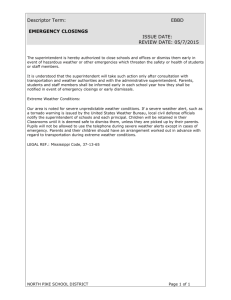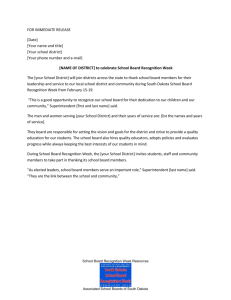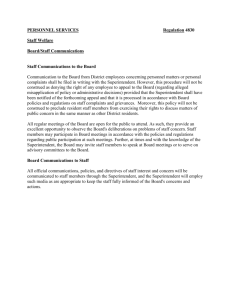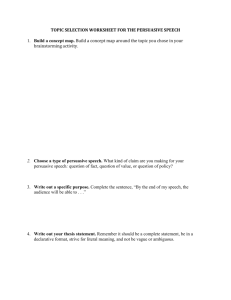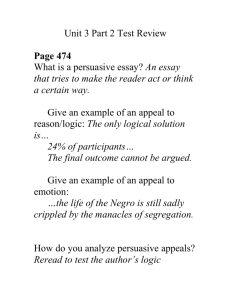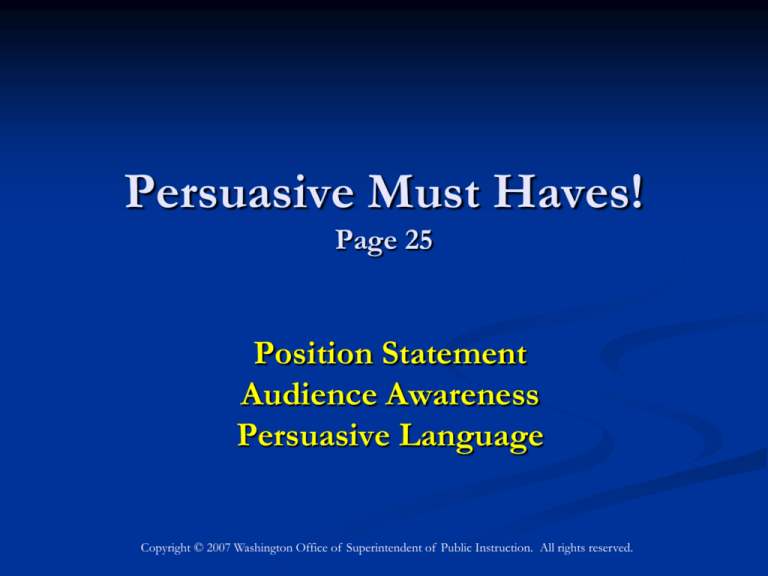
Persuasive Must Haves!
Page 25
Position Statement
Audience Awareness
Persuasive Language
Copyright © 2007 Washington Office of Superintendent of Public Instruction. All rights reserved.
Clear PositionWhat is it?
1. A position or argument; it lets the
audience know exactly what the
writer wants
2. The writer must clearly state
position and stay with that idea.
3. Generally, the position is stated
in the thesis.
Copyright © 2007 Washington Office of Superintendent of Public Instruction. All rights reserved.
Why is it important?
With the person sitting next to you, discuss why
having a clear position would be important.
Be ready to share!
Copyright © 2007 Washington Office of Superintendent of Public Instruction. All rights reserved.
Why is it important?
Write this in your notes:
It lets the reader know exactly what you think.
It defines the mood of the essay.
Clear Position – example
At first that sounds unbearable for us kids, but when you
really look at it you see it does more good than bad. Just
simply turning in our homework on time prepares us for
the hurdles life throws at us. Have you ever thought to
look at it from the teacher’s point of view? They don’t
really want to grade a late assignment from last quarter.
Having no late homework will also be very pleasing to
those of us who get their work done on time by not seeing
kids with A’s that haven’t turned a single assignment in on
time. Homework is something that everyone must do
in school; however, I believe that you must make a
rule against turning in late homework assignments.
Copyright © 2007 Washington Office of Superintendent of Public Instruction. All rights reserved.
Fix the Position Statement –
Example
Imagine you were a student sitting in your math class when your
teacher says, “Okay, get out your homework!” You rustle around
in your backpack for a while until you realize – oh no! You left
your homework at home perfectly done. The teacher comes by
your desk and you say, “I am sorry. I left my homework at home.
My mom just had a baby, so I was taking care of her, and I just
ran out the door without it.” Your teacher smiles at you. “It’s
okay. I understand. Just bring it in tomorrow.” Isn’t that a better
situation than “Oh too bad! You don’t get any credit for it.”?
Late homework should be accepted.
Copyright © 2007 Washington Office of Superintendent of Public Instruction. All rights reserved.
FIX the Position Statement
My feeling about the rule that teachers do not
accept late homework is definitely a mixed one.
I know that the rule has its pros and cons, but I
really do think that the cons heavily outweigh
the pros. I would like to show you, the principal,
my position on this rule in a little bit more
depth.
Copyright © 2007 Washington Office of Superintendent of Public Instruction. All rights reserved.
Audience Awareness
What is it?
The audience is who will read your writing.
2.
Providing info THAT audience may need
and/or anticipating an audience’s point of view
3.
Knowing your audience likes/dislikes before
you start writing.
1.
Copyright © 2007 Washington Office of Superintendent of Public Instruction. All rights reserved.
Audience Awareness
Why is it important?
Knowing who your audience helps you to
decide:
How to connect with the ideas, knowledge, or
beliefs of the person or group.
What information to include.
What arguments will persuade him/her.
How informal or formal the language should be.
Copyright © 2007 Washington Office of Superintendent of Public Instruction. All rights reserved.
Audience Awareness –
poor example
Dear Mrs. Gillingham,
The teacher yells, “Okay, get out your
homework.” You rustle around in your
backpack for a while until you realize -- oh no!
You left your homework at home, perfectly
done.
Audience Awareness – example
Dear Mrs. Gillingham,
Imagine you were a student, sitting in
algebra when your teacher says, “Okay, get
out your homework.” You rustle around in your
backpack for a while until you realize -- oh no!
You left your homework at home, perfectly
done.
Copyright © 2007 Washington Office of Superintendent of Public Instruction. All rights reserved.
Audience Awareness – example
If you are writing TO a teacher, don’t use
WORDS that are degrading to TEACHERS
if you want to persuade them to your side!
Copyright © 2007 Washington Office of Superintendent of Public Instruction. All rights reserved.
Persuasive Language
What is it?
Words and phrases that urge or compel the reader to
support the position of the author
1. Precise words
2. Repeated words
3. Different connotations 4. Persuasive words
Copyright © 2007 Washington Office of Superintendent of Public Instruction. All rights reserved.
Persuasive Language
Why is it important?
Persuasive language is choosing just
the right words or phrases to use at
just the right time with just the
right audience.
Copyright © 2007 Washington Office of Superintendent of Public Instruction. All rights reserved.
Persuasive Language Examples –
Divide your box in four parts. Choose one example from each for the boxes.
Precise
words trigger strong feelings.
Seizes
Snarls
Repeated
words or phrases for emphasis
I have a dream…(Martin Luther King, Jr.)
She knows…she knows (smiley face trick
Different
connotations
Mean vs. strict
Used or pre-owned
Persuasive
Words
Should, must, have to …yes you can use, but try to be more
creative!
Absolutely imperative, a matter of life or death, etc.
Find Words that Could Be More Persuasive
You are a young middle school student. Essay in one
hand, you go to class. “I’m done!” You are glad.
The teacher takes the essay out of your hands and
throws it away. She says, “It’s a day late!”
You look at your hard work. The teacher didn’t look at
it! The No Late Homework Rule is bad.
Copyright © 2007 Washington Office of Superintendent of Public Instruction. All rights reserved.
Persuasive Language- Redone
Imagine yourself as a young middle school
student. Five page essay in one hand, you rush into
the classroom. “I’m done! I’m done!” You pant,
beaming proudly.
The teacher seizes the essay out of your grasp and
tears it to pieces before your eyes. She snarls, “It’s
a day late!” On your knees, you stare dumbstruck
at your hard work, ripped to shreds. The teacher
didn’t even glance at it! The No Late Homework
Rule is a cruel, horrible rule.
Copyright © 2007 Washington Office of Superintendent of Public Instruction. All rights reserved.
Principal Scaddilybob
Take a look at the Principal Scaddilybob essay.
Underline the position statement.
Circle any/all words and phrase that you think
fit the criteria of persuasive language.
Write one sentence about how the author was
aware of their audience – meaning give an
example or two about what they did so you
know this was to a principal and not a kid or
parent.
Putting it together – Audience Awareness,
Clear Position, Precise Language
Practice- Write a short letter requesting that a teacher
changes a grade you would like to be increased.
Underline where you have used 5 persuasive language
choices.
Circle your position statement.
Write one sentence at the bottom of the letter that states
how you connected with your audience.
Copyright © 2007 Washington Office of Superintendent of Public Instruction. All rights reserved.



